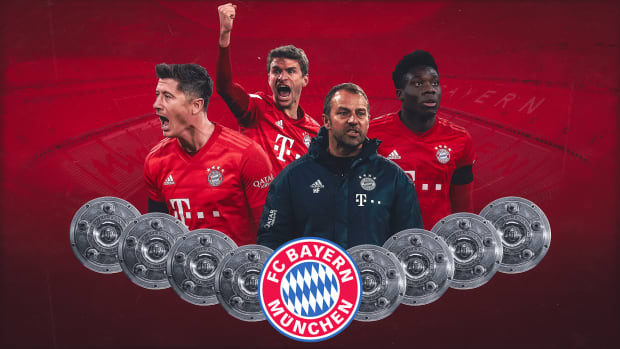Bayern Munich did not have a simple procession to an eighth straight Bundesliga title, but the club persevered through a transition period, was ruthless after the restart and remains the deserved class of Germany's top flight.
Bayern Munich has a problem, the same problem faced by Paris Saint-Germain in France, Juventus in Italy, Celtic in Scotland and various other perennial winners across Europe. It is too successful.
Confirmation of an eighth successive league title came with a 1-0 victory over Werder Bremen on Tuesday, secured with yet another Robert Lewandowski goal and a brilliant late save from Manuel Neuer. Bayern has clearly deserved it. In recent months, Bayern has been the best team in Germany. Since the Bundesliga's restart, it has been remorseless, winning seven league games out of seven and racking up 22 goals in the process.
But it’s impossible not to feel a little underwhelmed. Of course Bayern won the league. Its revenues are roughly 70% higher than the next wealthiest team in the league, Borussia Dortmund. It should win the league. If this sort of domination were happening only in Germany, it would be possible to argue that this is simply the product of an exceptional club. But the fact that this sort of streak is happening all over Europe suggests rather that there are forces at work far greater than one club and inspirational management or clever recruitment. The big teams win all the time; that is the economic moment we are living through.
That said, this has not been a procession. Last season, Bayern won the league by just two points and looked vulnerable, particularly with Dortmund threatening and RB Leipzig finding its feet in the Bundesliga. It started this season with uncertainty and was in fourth place when Niko Kovac was dismissed as coach after a remarkable 5-1 defeat at Eintracht Frankfurt at the beginning of November.

Hansi Flick took over, initially on a caretaker basis, and Bayern immediately won four in a row, scoring 16 goals in the process. There followed successive defeats to Bayer Leverkusen and Borussia Monchengladbach, which saw Bayern fall to seventh, but since then, Dec. 7, the club is unbeaten. Flick has won 26 of his 29 games in charge. Lewandowski has scored 31 league goals and 45 in all competitions. Thomas Müller has rediscovered his best form and has registered a Bundesliga single-season-record 20 assists. Joshua Kimmich is blossoming. David Alaba has had a new lease on life since switching to center back, where he seems also to have rejuvenated Jerome Boateng while simultaneously making room for the remarkable Alphonso Davies at left back (even if he should have been sent off in the first half against Bremen, long before he was dismissed for a second yellow).
Having begun the season so uncertainly, Bayern ends it looking as good as it has probably since Pep Guardiola left. It’s not perfect, and there have been odd little wobbles against both Eintracht Frankurt and Leverkusen (while Dortmund will wonder what might have been had Boateng’s handball to deflect an Erling Braut Haaland shot wide been punished), but every time a crisis has begun to approach, it has been cuffed aside.
Bayern Munich has the best players in Germany, but it also has its old self-assertiveness back and is playing tactically the best football. A treble, last achieved under Jupp Heynckes in 2013-14, is a very definite possibility, with Bayern into the DFB Pokal final and all but into the Champions League quarterfinals. Bayern perhaps hasn’t been overly extended yet in the Champions League this season–and the structure and timing of the remainder of the competition remain wild cards–but the demolitions of Tottenham in the group stage and Chelsea in the first leg of the last 16 offered a clear indication of its quality. There had been a thought when Flick was given a three-year contract at the end of April that he was a beneficiary of the pandemic, and that Bayern might not have been so ready to turn to him had there not been such general uncertainty. What has happened since the resumption, though, has suggested it was the right decision.
Having looked so slow and stodgy and in need of reconstruction in being beaten by Liverpool in the Champions League last season, the new Bayern has emerged quicker than anybody could have imagined, with Serge Gnabry at the forefront of the new generation. Davies is still only 19 and Kingsley Coman is 24, while 23-year-old goalkeeper Alexander Nubel will join at the end of the season. It’s been speculated that Leroy Sane will also arrive from Manchester City before the start of the new campaign, while there’s also reported interest in landing Kai Havertz from Leverkusen. There will almost certainly be an attempt to bring in a more attack-minded right back, too.
For teams that have had sustained success, transition can be the hardest thing to manage. Over the last two summers, Bayern has lost Arjen Robben, Franck Ribery, Mats Hummels, Rafinha, Douglas Costa and Arturo Vidal. That made the situation harder for Kovac, although it was his style as much as anything else that raised questions. The old guard, bar Neuer, has gone now and the way forward is clear. Flick has managed already to impose a more modern progressive style.
But the big worry for German football is that even in a time of transition, Bayern kept winning the league. The Bundesliga no longer feels like a challenge.